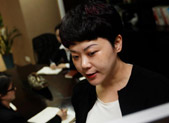
 |
| Yuan Xiaohong, 60, takes a dancing class at the Chinese Academy of Sciences' College for the Elderly. Th e huge number of retirees enrolling at "universities for the aged" is placing pressure on the education system for the elderly. [Photo by Wang Jing / China Daily] |
Growth trend
Although the number of retiree schools rose to almost 43,000 in 2011 from 26,000 in 2005, they are still unable to meet the demand resulting from the rapid rise in the number of retirees.
The central government's 12th Five-Year Plan (2011-15) related to aging pledged to increase investment in colleges for retirees and expand the scale of the schools. The plan also encourages social efforts to jointly develop education for retirees.
"It's very important to establish relevant regulations and laws for the education of retirees. If education for retirees were written into law, all the difficulties could be fixed over time, and under the guidance of the regulations," said Yuan.
He believes that a national policy could also address the problem of over-demand and suggested research be conducted into distance learning. "Students could watch the course video at home, complete their assignments and bring them into class," he said, adding that the new teaching model would reduce the pressure for places and provide greater opportunities for students to engage with classmates and teachers.
Chu from the BHUS believes the demand for colleges for retirees will rise. "Retired people don't need to worry about money. They pay more attention to their spiritual lives. Returning to school is one of the best choices for them," he said.
For Song Qing, her calligraphy and painting classes have added a new dimension to life. "Sometimes I can't stop painting at night. I often paint until 2 or 3 am. Coming back to school has made me feel young and passionate again," she said.

















 Modern movie dream in retro Mingguo street
Modern movie dream in retro Mingguo street


![]()
